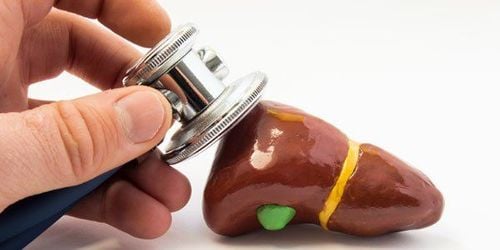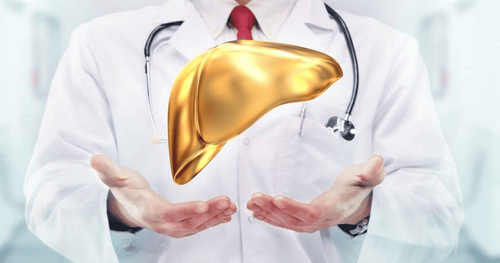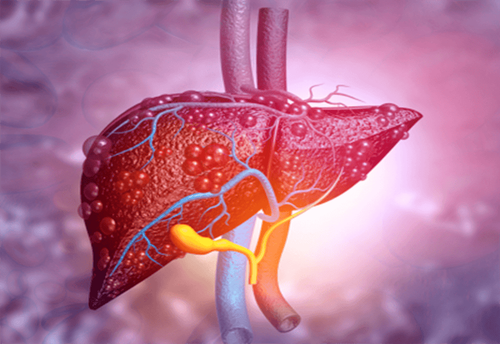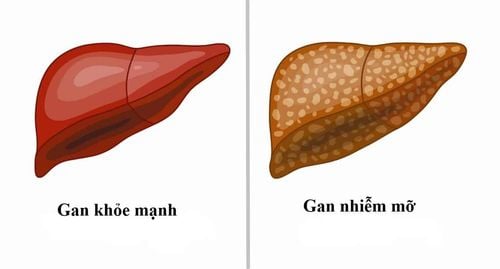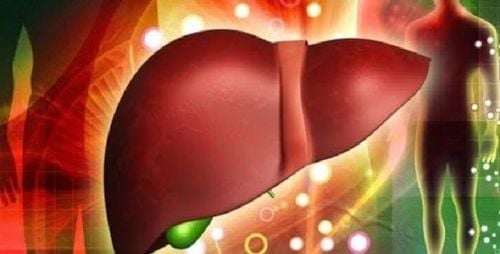This is an automatically translated article.
The article was written by TS.BS Tran Thi Phuong Thuy - Hepatobiliary Specialist - General Internal Medicine - Vinmec Times City International HospitalHepatitis is a general term for inflammation of the liver. There are many different types and causes of hepatitis (eg, viruses and certain medications), including autoimmune hepatitis. In autoimmune hepatitis, the body's immune system attacks the liver cells, causing inflammation of the liver.
1. What causes autoimmune hepatitis?
It is not clear why a person develops autoimmune hepatitis. Researchers think that some people carry genetic genes that make them susceptible to the disease. Certain medications or infections are triggers for the disease to develop.There are 2 main types of autoimmune hepatitis: type 1 and type 2
Autoimmune hepatitis type 1 can cause disease at any age. Type 2 autoimmune hepatitis is more common in girls and young women, and less common. There are also a few forms of autoimmune hepatitis that have both features of autoimmune hepatitis and other liver diseases, for example primary biliary cirrhosis and primary cholangitis.

2. How does autoimmune hepatitis manifest?
Many patients with autoimmune hepatitis have no symptoms. Disorders are often discovered incidentally by testing for another reason, such as a physical exam.
If symptoms are present, fatigue is most common. Some people may experience yellowing of the skin and eyes, itching, rash, joint pain, upset stomach, vomiting, nausea, loss of appetite, dark urine, and discolored stools. In severe cases, autoimmune hepatitis can progress to cirrhosis.
3. How is autoimmune hepatitis diagnosed?
Diagnosis of autoimmune hepatitis by blood tests and liver biopsy .
There are many blood tests used to evaluate hepatitis and immune disorders associated with autoimmune hepatitis. The specialist will decide what tests you need.
During a liver biopsy, a very small piece of liver parenchyma is removed through the biopsy needle and examined with a microscope. Liver biopsy can both confirm the diagnosis and determine the severity of the disease, and can help rule out other causes of liver disease.
Currently, Vinmec International General Hospital is one of the medical facilities with a team of leading medical experts in the field of Liver - Gallbladder - Pancreas, the most modern machinery in the region. These will be good conditions to help the examination, screening tests or biopsies to diagnose liver cancer be quick, convenient and time-saving so that appropriate and timely treatment measures can be taken. time.
Please dial HOTLINE for more information or register for an appointment HERE. Download MyVinmec app to make appointments faster and to manage your bookings easily.
4. Can autoimmune hepatitis be treated? And how is the treatment?
If left untreated, autoimmune hepatitis can cause scarring of the liver, leading to cirrhosis and liver failure. Fortunately, appropriate treatment can prevent scarring and cirrhosis in the majority of patients. Treatment is beneficial even when scarring and fibrosis are present, as it stops the progression, and sometimes reverses, scarring of the liver.
Not all cases of autoimmune hepatitis require immediate treatment. Doctors will decide on treatment based on the severity of symptoms, the severity of the disease (based on blood test results and liver biopsy), and the risk of side effects from the medication.
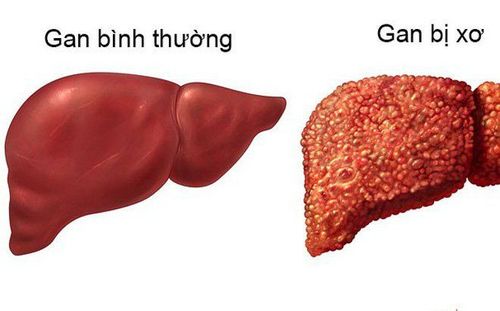
4.1 Drug treatment
Autoimmune hepatitis is usually treated with glucocorticoids (such as prednisone).
Glucocorticoids - Glucocorticoids such as prednisone control inflammation of the liver, thus preventing scarring of the liver (preventing cirrhosis). The main disadvantages of Prednisolone are many side effects, such as weight gain, acne, osteoporosis, hyperglycemia (risk of diabetes), increased risk of infection, cataracts, increased blood pressure, confusion. sleep and emotional disturbances. ... People who need to take long-term Prednisone should be closely monitored to detect the above complications. To minimize the risk of side effects, Prednisone is usually taken at the lowest possible dose.
Azathioprine or 6MP – Drugs that can be combined with Prednisone to treat are usually Azathioprine or 6MP, or methotrexate, or mycophenolate mofetil. The benefit of this combination is the reduced dose and side effects of prednisone. Azathioprine or 6MP can also cause side effects such as allergic reactions, leukopenia, pancreatitis, vomiting, and abnormal liver function (which can confuse liver damage from autoimmune hepatitis). or drugs). Therefore, it is necessary to monitor blood tests to detect these disorders.
Mycophenolate may increase the risk of infection or cancer, and should not be given to pregnant women. Both men and women taking this medicine must use at least two effective methods of contraception (eg, using a condom and taking the pill). Budesonide - another drug to support Prednisone, is still being studied and used more in Europe. Budesonide should only be used in patients without cirrhosis. Duration of treatment:
In general, treatment should be prolonged until remission, or treatment failure, or drug side effects.
Remission is defined as when there are no symptoms, blood liver parameters return to normal or near normal, and there is improvement of liver tissue on biopsy. Usually, remission occurs after more than 12 months of treatment. Most patients achieve remission after 18 months to 3 years of treatment.
Nearly 50% of patients will experience prolonged remission or only mild symptoms for months or years after stopping the drug. However, the majority of patients often need to be re-treated due to recurrence of the disease. Relapse usually occurs after an average of 15 to 20 months after stopping the drug. Patients who had cirrhosis before treatment were more likely to have a relapse.

4.2 Non-pharmacological treatment
If there is no indication to take medication, the patient should be examined by a doctor and tested every few months. Liver biopsies are usually repeated at least every 2 years.
5. Building a diet and living for people with autoimmune hepatitis
Take your medicine regularly and see your doctor by appointment to make sure you get the right treatment and maintain a healthy liver. Diet? - No diet has been shown to improve the condition of patients with autoimmune hepatitis. A regular, healthy and balanced diet is recommended to avoid obesity, as obesity increases the risk of fatty liver, complicating existing autoimmune hepatitis. Wine? Alcohol should be avoided as it can cause fatty liver and other liver damage. All alcoholic beverages are harmful to the liver, including beer, wine, and liqueurs. Liver disease can worsen with even small amounts of alcohol. Exercise? Exercise is good for general health and should be encouraged, but there is no clear evidence that it is beneficial in people with autoimmune hepatitis. Prescription and Over-the-Counter Medicines – Many drugs are broken down in the liver, so consult your doctor or pharmacist before starting any new medication. Unless the liver is already cirrhotic, most medications are generally safe to take. Some patients with active liver disease require a lower dose of the drug. An important exception is Acetaminophen (Decolgen, Panadol, Efferalgan, Tiffy, ... ), commonly used to relieve pain, reduce fever. For people with liver disease, the maximum daily dose should not exceed 2000 mg. Thus, only 500 mg should be taken at a time, 4 to 6 hours apart, and should not be more than 4 times per day.
Herbal medicines? There are many unverified claims, especially on the internet, that herbs can improve your liver. However, the truth is that no drug or herbal combination has been shown to improve the outcome of people with autoimmune hepatitis. Certain herbs can cause more severe liver damage, and some have been implicated in triggering autoimmune hepatitis. For this reason, we do not recommend any herbal medicine for the treatment of autoimmune hepatitis. Support: Don't underestimate the role you share with other people with autoimmune hepatitis. Ask your doctor about support groups or other patients who would like to share their experiences with autoimmune hepatitis.

6. If I am being treated for autoimmune hepatitis and become pregnant, should I continue taking the drug?
Women on treatment for autoimmune hepatitis who become pregnant should continue their treatment with pregnancy-safe medications such as glucocorticoids and/or azathioprine. Treatment should not be stopped during pregnancy because it may cause recurrence of the disease.
In addition, children of women with autoimmune hepatitis may be at higher risk (compared to other women) for premature birth, low birth weight, and other problems. Women should be closely monitored during pregnancy and for several months after giving birth because of the risk of disease flare-ups.
>> See more: Test to identify 14 autoantibodies in autoimmune liver disease - Article by Master, Doctor Tran Quynh Trang - Doctor of Biochemistry - Laboratory Department - Vinmec Times City International Hospital
Articles refer to the source: Update.com





